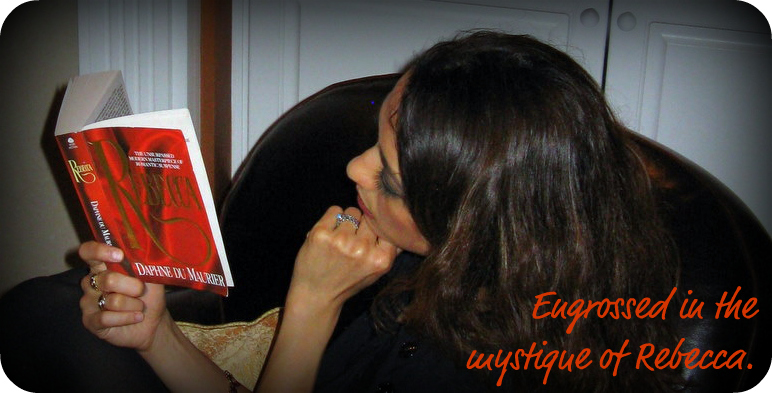In my mind, I was driving to Manderley last night.

I was driving my little Honda down a remote highway when I went into this state of complete mental absorption. Less than a day after finishing Daphne Du Maurier’s classic of a novel, Rebecca, I was finding it nearly impossible to stop thinking about Manderley, the magnificent estate and grounds and a central part of the novel. But this time, I was not particularly thinking about the story. No. I was living in it momentarily. I had a notion that I was driving to Manderley on that very road, veering left and right, winding down a path with the large hanging trees, past the sidewalks covered with the fallen autumn leaves which are sometimes tossed about by the soft palm of the wind, and heading towards the light orange sky with the deep blue clouds in the horizon. It could very well have been the road to Manderley. How fantastic and exciting it all seemed. How swift a return to reality too. Sigh. Is it normal for you to fantasize about fictional places that surely do not exist but in the figment of the author’s imagination, and now in yours as a reader?
I am constantly in awe that time and again, an accomplished writer can spark our imagination to believe these vivid characters and places are real, as real and absolute as the sound of birds and hustle of trees. The greatest authors of our time must have observed these events and characters at some point in their lives and then lived to write about them. They could not have just created them out of thin air, such lucid characters, such vibrant places. Moreover at times, the authors choose to destroy that which they so carefully depict for us over the course of some 300 pages, all at the hands of some evil character at the most opportune time! Sometimes, I think I should have a voice as a reader. An opinion. A poll. Especially in the shock saved for all of us at the end of Rebecca. Wishful thinking! Nonetheless, my hat off to the gifted mind of Daphne du Maurier who gave us Rebecca, Mrs. Danvers and most of all, a place called Manderley.
Du Maurier wrote this book in 1938. A little over 70 years ago. I read it first when I was 19. This is the first time I decided to re-read a book. Not a foreign concept to the general public. I have met many people who make a regular practice of it. For me, I could not conceive of it, not with my stack of unread books calling my name at every turn. Oddly enough, I can watch my favorite movies over and over, on the rare occasion that the luxury of time grants me the pleasure but not re-reading a book. Until a few weeks ago when I decided to bend the rules and read a memorable book from my late teenage years, and I can now finally appreciate the experience of re-reading a book, especially with a 15-year span in between reads. The appreciation comes down to one shocking reason: From my first reading, I had retained neither the climax of the story, nor the incredible journeys of the narrator through the mansion’s Drawing Room or Morning Room or the enormous gardens and grounds. I had retained only one thing: the mystique of Rebecca.
Reading is the best pastime for an active mind! If you like to see the other book reviews, check the index of In Print.
In this murder mystery romance thriller, you become one with the eyes and ears of Manderley, the magnificent estate where Mr. Maxim de Winter resides. You follow our narrator’s every single discovery and observation as she first meets Maxim down in Monte Carlo, and quickly – very quickly – is married to this recently widowed man, 20 years her senior. The courtship is short, and the honeymoon is swift and the return to Manderley inevitable. The new Mrs. de Winter, whose first name we never learn, takes us with her into the mysterious air of Manderley where the spirit of the late Mrs. de Winter, Rebecca, is eerily following her in every turn. She tries very unsuccessfully to adjust to her new life, to the long silences of her husband, to the staff and strict daily routines, to the peculiar few people in Maxim’s life, and worst of all, to Rebecca’s most loyal servant, the vicious Mrs. Danvers.
I find it strange that I loved the novel without liking or affording any sympathy toward the main character and narrator. Her shyness is despicable, her appearance awkward, her low self-confidence annoying, and her actions cowardly, belonging more to a child than the would-be mistress of Manderley. She flounders and fumbles in all she attempts from checking the day’s menu to arranging her books on a shelf that cause her to break – and subsequently hide all evidence of – a rare expensive cupid china treasure. She is forever helpless and apologetic. She hardly makes an effort to change her massive weaknesses, as Maxim truthfully points out, to which she argues that this is hard for her and she was not brought up on this life. Her actions are highly driven by the opponent she has created in her mind, Rebecca, a force that quite obviously, she cannot content with, for how do you fight a person in death?
The romance, if you can even call it that, between Maxim and the narrator is of a dull, quiet, and often absent nature. Her love for him, in her own words was in “a sick, hurt, desperate way, like a child or a dog.” His affection for her is much like his affection to the family dog, Jasper, as she accurately describes. Later when he confides in her with his secrets, the appearance of that love seems to change but the essence is the same. One never feels as though either loves and worships the other desperately. It is all driven as a result of outside circumstances. Fear, loneliness, desperation, and shock are the main elements in this cold and quiet relationship between the current Mr. and Mrs. de Winter.
Rebecca embodies a powerful and willful woman with elegance and grace. With her slanted handwriting, her flawless angel-like beauty, her command of Manderley, her high confidence of self, her desire to do as she pleases to whom she pleases, and her fear of nothing, she is potent as fire, beautiful as fire, and hard to resist as fire. I loved the character of Rebecca. I identified with her strengths, without condoning her vices and faults. Can you not love a character for all her traits, without approving of all her actions? I loved the Rebecca who was not afraid of anything in life except the one ironic thing of all, disease and getting old.The Rebecca who lived as she pleased, without letting convention or society dictate the terms to her. The Rebecca with her highly attuned sense of style and fashion, her daring actions and her bold adventures. The only mistress of Manderley, and a character that failed to seem evil or corrupt to me despite Daphne du Maurier’s best attempts.
I remember telling the story of Rebecca to my husband in “cliff note” style. He immediately resented her and thought her rightfully disposed of. I just realized we had the same conversation, in vehement disagreement no doubt, about George Bizet’s Carmen, my favorite all-time opera. Carmen and Rebecca walked and lived with that same sense of pride and self-assurance about life, invariably cultivating their adamant determination of living as they pleased. They both suffered death as a consequence of living that way. They both leave a permanent imprint with me. I strip away from them the best traits of their characters, leaving out the less-than-ideal actions that led them astray. Yes, we can choose to love and learn from any character. For me, I loved Rebecca, even in death.
Rebecca is a classic, and can withstand the test of time – both the novel, and the character. The writing is superb. The elaborate descriptions of Manderley and the key characters, all wrapped within the mystery that starts to unfold one thin layer at a time, it all makes for a fantastic read. There is this leery sense of quiet and calm in large portions of the book, and hours and days of the ordinary are disrupted by a sudden aberration from the norm. Sometimes, there is much dullness in this English countryside, and in fact, I pity the bore that our narrator generally seems to be, both to herself and to us as a reader. But I forewarn you, the book is addictive, and once started, must be finished.
Amidst all the incredible passages, I picked out few of my many, many favorite phrases and descriptions from the accomplished writings of Daphne Du Maurier:
“..for me a rhododendron was a homely, domestic thing, strictly conventional, mauve or pink in colour, standing one beside the other in a neat round bed. And these were monsters, rearing to the sky, massed like a battalion, too beautiful I thought, too powerful, they were not plants at all.”, describing the flowers on the entrance to Manderley, the favorites of Rebecca, and similar to her in excessive beauty and power. -pg 63.
“It was as though she had arranged this room and had said: “This I will have, and this and this”, taking piece by piece from the treasures in Manderley each object that pleased her best, ignoring the second-rate, the mediocre, laying her hand with sure and certain instinct only upon the best.”, the narrator referring to Rebecca in the description of the famous Manderley morning room. An instinct that I can truly identify with. -pg 83.
“I began to understand why some people could not bear the clamor of the sea. It has a mournful harping note sometimes, and the very persistence of it, that eternal roll and thunder and hiss, plays a jagged tune upon the nerves.“, the narrator explaining her gladness that her room in the East Wing faces the garden not the sea. -pg 119
“No crisis can break through the crust of habit”, the narrator observing the tea ceremony right after Maxim makes a confession to her that could change their lives. -pg 318.
“The peace of Manderley. The quietude and the grace. Whoever lived within its walls, whatever trouble there was and strife, however much uneasiness and pain, no matter what tears were shed, what sorrows born, the peace of Manderley could not be broken or the loveliness destroyed.”, on the morning of their final departure from Manderley to London. -pg 357.

 I am Farnoosh, the founder of Prolific Living. So glad you are here. My mission is to empower you to unblock your creative genius to live your dream life.
I am Farnoosh, the founder of Prolific Living. So glad you are here. My mission is to empower you to unblock your creative genius to live your dream life.